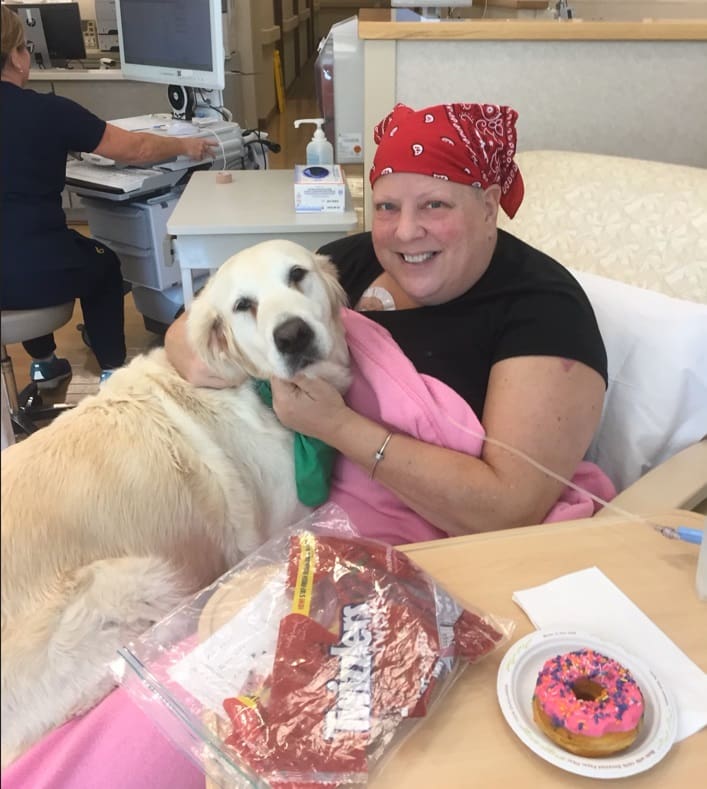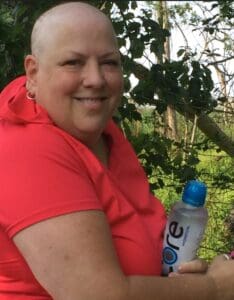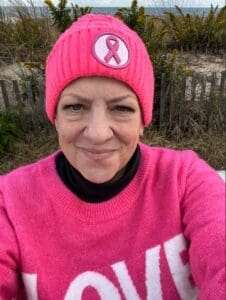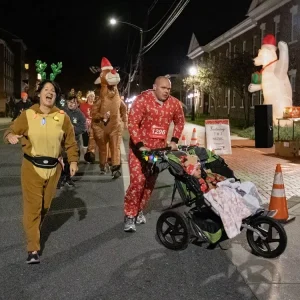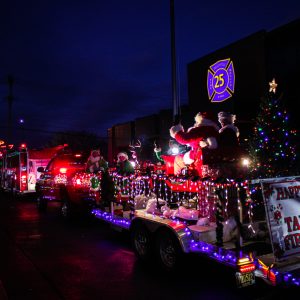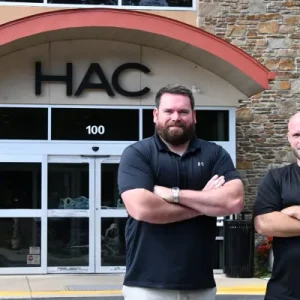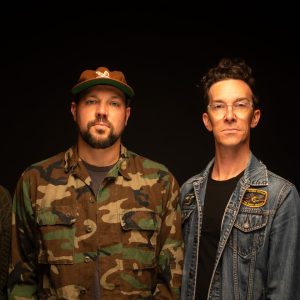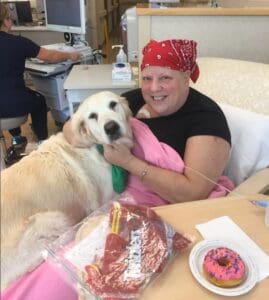
Karen Laitman enjoys a visiting dog while going through chemotherapy to fight breast cancer.
Karen Laitman’s mother, grandmother, sister and maternal aunt all were diagnosed with breast cancer.
Her mother, Elinor, died from it at the age of 56 in 1990. Her grandmother was diagnosed when she was 100, and the family doesn’t know how much of a factor it was in her death at 102.
It’s a genetic curse that follows their heritage. They are Ashkenazi Jews, a group that carries the BRAC1 gene mutation that often leads to triple negative breast cancer, a beast to fight, and ovarian cancer.
After their mother died, Karen and her sister, Melissa, were faithful about getting annual mammograms to try to catch the illness early.
Then Melissa was diagnosed with cancer in 2006.
Karen turned to the Delaware Breast Cancer Coalition for help in understanding what was happening to her sister and how to help.
“DBCC had a survivor support group that provided information and education,” she said. “For example, what to expect with chemotherapy and tips on how to cope with treatment, as well as emotional support for families and loved ones.”
In 2007, Karen was tested for the BRAC1 gene and discovered she had it, which by then was no surprise.
More people diagnosed with that gene proactively have surgery to remove their breasts, ovaries and often their uterus.
“I didn’t act fast enough,” said Laitman. “I went to all my regular mammograms, and that’s what I did. I knew it in the back of my mind, and I was just kind of watching it, hoping that it did not come back positive for me.”
But in 2017, it did.
Cancer comes for her
“From the moment I was diagnosed, I became a thriving survivor, armed with the knowledge and support needed to conquer this disease, thanks to DBCC,” Karen told a group gathered for the April Broadwalk on the Boardwalk fundraiser she helps organize each year.
DBCC helped her find peer mentors who were a similar age with a similar diagnosis, treatment, surgery and lifestyle.
“They provide free one-on-one personalized support,” Karen said.
In Karen’s case, they were Connie Holdridge and Meridith Rothstein, people she says stayed by her side for a ride that’s not finished yet.
Karen and her doctor decided she should have a lumpectomy, chemotherapy and radiation. She also had an oophorectomy to remove her ovaries because cancer there can be harder to spot in early stages, which makes it harder to treat.
The chemo was way more brutal than Karen expected.
“I couldn’t work for a year because of chemo brain,” she said. “I could not do two things at one time. I tried to drive my car out of my driveway and crashed it into the fire hydrant. Words wouldn’t come to me. My Word Bank was gone.”
When as the end of her family and medical leave neared, Karen returned to the office of the agency where she worked inn case management for individuals with intellectual and developmental disabilities. She wanted to pick up a few things.
She was surprised to be escorted to the human resources manager, who asked if Karen could start coming into work three days a week. Karen was stunned. She said she was still in chemo treatments and didn’t think she couldn’t handle it.
The manager suggested she work from home two days a week and come in once a week. Karen told her that she really didn’t think she could do it, mentally or physically.
The manager said the CEO wanted to see her.
He asked how she was. She told him she felt like death walking.
“Well, you know, my wife had cancer and she ultimately ended up, you know, passing away,” he told her. “And the best things she did was leave work, so that she can spend time with her family. I think you should resign.”
He told her there would be a job for her when she felt better.
She was so exhausted, she didn’t fight him or it. As soon as her FMLA was up, she sent in a resignation letter.
That wrecked her finances, and she again turned for help to the coalition, which got her through some difficult months by paying her power and water bills.
Chemo hell
Her chemo was designed to last six months. She was having so many side effects, including needing a blood transfusion, that her doctors cut the chemo short a month. She had a month off and then started radiation every day for six weeks.
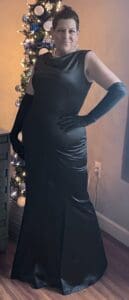
Two weeks after her mastectomy, Karen Laitman went to the Delaware Breast Cancer Coalition’s gala fundraiser, although she admits she didn’t stay long.
Holdridge and Rothstein “took me to some of chemo infusion treatments, called me weekly — they always seemed to know when I needed a call the most,” Karen said. “They sat with me during a necessary blood transfusion as well as brought me homemade matzah ball soup, which always lifts my spirits.”
At the end of the radiation, she began having two tests a year: A breast MRI followed six months later by a mammogram.
Life calmed down.
Karen took another job in April 2018 and then a year later went to work for the state in the same area.
“I love, love, love my job,” she said.
She participated in several of DBCC’s programs, including Nurture with Nature, during which she and other survivors went hiking, build bird houses, toured wildlife sanctuaries, made holiday cards, went dolphin watching, learned to solder to create jewelry and participated in a night-time yoga/meditation class.
Karen completed the organization’s free, 12-week Yes2Health program that includes fitness and wellness education as well as healthy cooking demonstrations to help patients and survivors live as active and health a lifestyle as possible.
She even attended some of DBCC’s “Lights of Life” fundraiser gala at Bally’s Casino in Dover.
But in 2021, she began having started having signs that the cancer was back and had spread.
Her lymph nodes swelled, she was having night sweats, she lost a large amount of weight.
Tests made doctors think the cancer was back and had spread.
“They were saying I’d be in chemo for the rest of my life and, basically, to start digging my grave,” Karen remembered.
She went to UPenn for a second opinion, which turned out to be puzzling. Doctors there said her chemo must be working because her tumors were shrinking.
“I told them I wasn’t in chemo,” Karen said.
The doctor, as puzzled as she was, sent her to an infectious disease doctor. There, she was diagnosed with Cat Scratch Fever. People can get it from a bite or scratch and its symptoms often mimic the flu.
Karen was put on a high dose of antibiotics for four months, and now tries her best to never touch her cat.
Two years later, in 2023, the cancer did return. A mammogram showed it dots of it in one breast.
Tired of the worry and the stress, Karen chose to remove both breasts in a radical mastectomy, opting to have reconstructive surgery later.
Back with the coalition
She got back in touch with the breast cancer coalition and told them what was going on, how many questions she had, how nervous she was about the surgery and the pain that would follow.
The coalition set her up with another peer mentor.
“After speaking to her, I was able to find some peace,” Karen said.
After the surgery, she returned to DBCC for help once more when she had decide how to handle wearing prosthetic breasts. Before surgery and her weight loss, she had a large bra cup size. After the surgery, she didn’t want to call attention to her chest.
The coalition’s Bosom Buddy program helped her find the underwear she’s comfortable in. She started with a much smaller cup size but has gradually increased the size to suit her vision of herself.
Around the house, she goes without the prosthetics.
“Sometimes, if I’m feeling like I want to — you know — look cute, I’ll put my boobs on,” she said.
RELATED STORY: Improvements in reconstruction one focus of breast cancer update
Her growing comfort with going without led her to realize she didn’t need or want reconstructive surgery.
Instead, she soon will go in for surgery to remove some excess skin and effectively smooth out her chest because the mastectomy had been done in anticipation that she would want implants later.
Karen now has served as a peer mentor to two breast cancer patients.
Peer mentors are required to participate in a three-hour training that covers listening and problem-solving skills, handling difficult situations and reporting requirements.
“I learned through lectures, interactive activities and role play,” she said.
She’s learned that many people have no idea about the range of services offered by the coalition, and works to spread the news.,
“I am no longer a survivor. I am a warrior,” she told the crowd at the Broadwalk. “And I am forever grateful to everyone at Delaware Breast Cancer Coalition.”
RELATED STORIES:

Betsy Price is a Wilmington freelance writer who has 40 years of experience, including 15 at The News Journal in Delaware.
Share this Post


